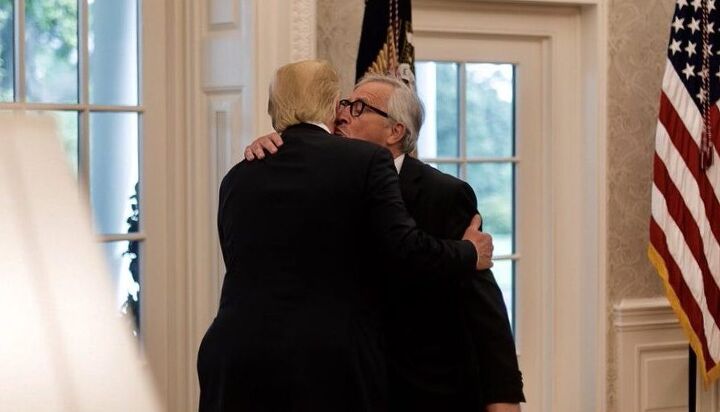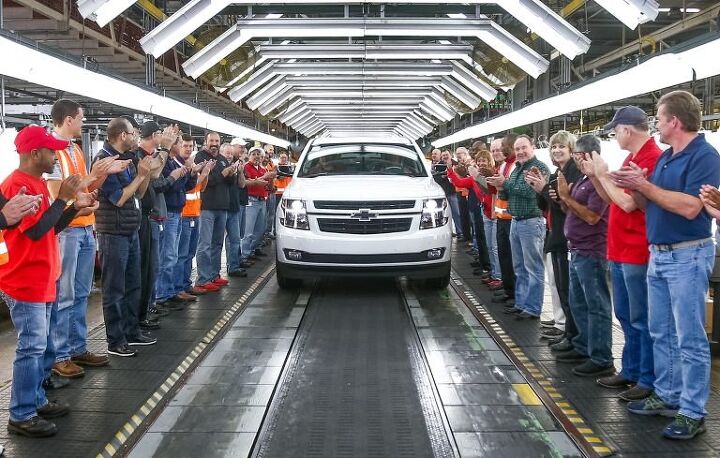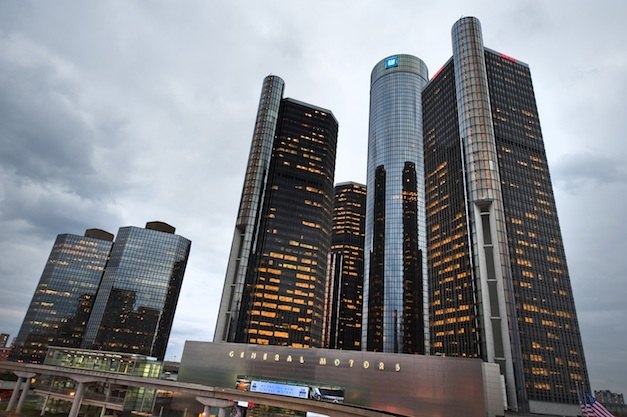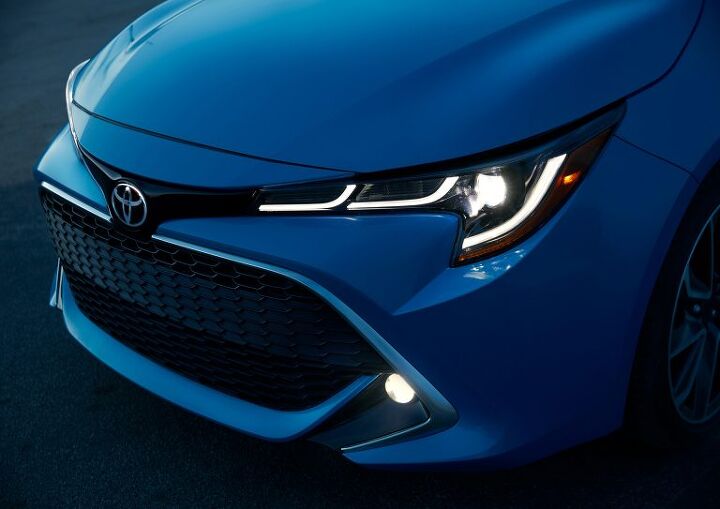#DonaldTrump
Gas War Watch: Canada Sides With California
Canada’s federal government announced it has signed a memorandum of understanding with California to further reduce vehicle emissions. It would appear that the United States’ neighbor to the north has chosen a side in the gas war — at least spiritually.
Canadian Environment Minister Catherine McKenna, along with California Governor Gavin Newsom, announced the agreement’s signing on Wednesday.
“As the world’s fifth-largest economy and a global leader in clean transportation, California is a leading example of how climate action can be good for people, the environment and the economy,” McKenna said. “We look forward to working with California to fight climate change, keep the air clean and give drivers better options for cleaner, more affordable vehicles.”
Meet Us in the Middle: Automakers Plead for Peace, Compromise Between White House and California
The automotive industry is in turmoil. There’s an industrywide push toward electrification that has yet to prove itself as truly profitable, volume seems to be tapering off in the developed world, and emissions regulations aimed at improving air quality are operating counter to existing consumer tastes. As a result, automakers are scrambling to find the best path forward.
In 2017, that path involved encouraging the new U.S. president to roll back Obama-era fuel economy mandates, thus providing some breathing room and staving off fines as automakers began to realize they wouldn’t be able to meet tightening targets. The administration listened, leading to a proposal that would effectively freeze mileage standards at about 37 miles per gallon — rather than the previously decided 54.5 mpg — by 2025.
However, California and a coalition of supportive states claim they won’t be going along for the ride. This group says it will maintain the old standards, regardless of what the White House says. The staredown has automakers worried; they’ve now banded together to issue a letter asking both sides to calm down and keep talking.
Trade War Watch: Automotive Tariffs and the European Union
It’s been nearly a year since President Donald Trump and European Commission President Jean-Claude Juncker kissed and negotiated a temporary truce aimed at buying the United States and the EU time to renegotiate their positions without fear of new tariffs.
Unfortunately, it seems everyone had better things to do following the smooch.
Playing Both Sides: How Toyota Is Rolling With the Trade War Punches
While it’s difficult to muster sympathy for giant corporations, the trade war current raging between the United States and China has left many stuck in an industrial limbo. Automakers want a bigger slice of the global market, but putting your eggs in either country’s basket will result in repercussions from the other.
We’re not saying this to promote some kind of commiseration for multinational companies; rather, it’s simply to remind everyone of how the auto industry has to conduct its business. Frequently, carmakers must play both sides. Toyota, already one of the world’s largest automakers, knows this better than anyone, and new documents shed light on some of the cloak-and-dagger aspects of maintaining its high-volume position.
Trade War Watch: Truce Ends, Tariffs Up, Talks Resume, Trump Tweets
Following an announcement that trade discussions with China had effectively broken down, President Donald Trump increased tariffs on $200 billion in goods from the country on Friday. The White House also issued an ultimatum, saying Beijing had about a month to reach an agreement before the U.S. enacts another 25-percent duty on $325 billion previously unaffected Chinese imports.
White the trade war has been in full swing for most of Trump’s time in office, the White House had indicated that discussions with China were progressing at the start of May. That changed after the People’s Republic returned a modified trade agreement that removed much of the legal language that would have made it binding while reneging on other aspects U.S. negotiators already assumed were settled. President Trump cited the backtracking as the primary reason for imposing a new round of tariffs.
Fortunately, the U.S. International Trade Commission said the tariff hike would only affect $2.3 billion worth of automotive goods — ranking them 10th on the list overall.
Industry Expects White House to Postpone Auto Tariff Decision 180 Days
Even though the United States plans to impose heftier trade duties on China tomorrow, and vice versa, automakers remain confident that the White House will decide to delay the hiking of other automotive tariffs on national security grounds.
The Commerce Department submitted its Section 232 national security report in February, leaving President Trump until May 18 to act. But manufacturers believe the preferred move will be to postpone the final decision another six months.
Trade War Watch: It's Okay to Feel a Little Sorry for Harley-Davidson
Last summer, the European Union imposed an additional 25-percent import duty on top of the existing 6-percent tariff levied on large motorcycles. Established as a response to the United States’ duties on steel and aluminum, the move crippled Harley-Davidson’s ability to thrive in the European market — a region that accounts for about one-sixth of its global volume.
While much of the media is focused on framing Donald Trump for Harley’s plight, the situation is a little more complicated. The president’s tariffs did indeed spur the EU’s retaliatory fees, but it was Europe that decided to place its crosshairs upon the iconically American motorcycle brand.
Border Backups Follow Trump's Closure Threat
Far away from most American cities, and unbeknownst to most consumers, a transportation bottleneck is stemming the flow of goods from Mexico to the United States.
Major border backups plagued Mexico-U.S. crossings this week, the result of threats made last week by President Donald Trump. While the president eventually backed off after suggesting the U.S. may resort to closing the border in order to stem the flow of migrants into the country, companies didn’t waste time shoehorning as much product into trucks as possible, eager to get their goods across the border.
This, coupled with a mass transfer of U.S. Customs and Border Protection officers from commercial to immigration duties, sent wait times soaring. For automakers (and avocado sellers), this could be a problem.
How Seriously Should We Take Trump's Mexican Auto Tariff Threat?
On Thursday, President Donald Trump threatened to impose tariffs on cars entering the United States from Mexico if the nation doesn’t assist Washington in dealing with the migrant situation at its southern border. It’s a rather bold ultimatum, coming hot on the heels of claims that the White House was seriously considering closing the border entirely if Mexico could not curtail the flow of illegal immigrants and drugs heading north.
It’s an interesting situation, especially considering both outcomes would upend the automotive industry. But Trump argues that the growing reliance on Mexican manufacturing and proliferation of illegal immigrants has already hurt the United States badly. A contentious stance, for sure, but these are issues in need of thorough discussion. Gallup polls repeatedly peg immigration as one of the issues voters care most about — along with healthcare and the economy.
However, we only care about those things tangentially. It’s all about the cars for us.
Auto Industry 'Unites' Against U.S. Import Tariffs
Of all the things that automakers hate, losing money has to hold a permanent place at the top of the list. If you aren’t making money, you can’t keep building cars — and if you aren’t building cars then you’re not much of an automaker. Following that almost irresponsibly oversimplified logic, it’s no wonder the industry has been hesitant to endorse President Trump’s suggestion that the United States may need to enact new import tariffs.
While seemingly eager eager to provide manufacturers with the tools to get things done, the current administration clearly wants it done in America — and isn’t above punishing those who refuse to reciprocate. As a result, lobbyists have begun putting in some overtime.
Trump's No Fan of Autonomous Vehicles, Like Most Other People
Donald Trump apparently belongs to the 71 percent of Americans who remain averse to the thought of riding in self-driving cars. It’s a position that appears to be incongruous with the National Highway Traffic Safety Administration’s deregulation strategy. But there’s always a little room for someone’s personal preference to exist in tandem with public policy. At least, there used to be.
Considering the president’s involvement in American industrial matters routinely make him the central focus of auto-related topics, we’ll keep this one relatively brief. But the accompanying details of this story are too interesting to simply ignore.
President Trump Shares His Thoughts on GM … Again
President Donald Trump weighed in on General Motors again this week. This time, the issue at hand was the fate of Lordstown Assembly — which was shuttered earlier this month as part of the automaker’s ongoing restructuring program.
“Just spoke to Mary Barra, CEO of General Motors about the Lordstown Ohio plant,” Trump tweeted on Sunday. “I am not happy that it is closed when everything else in our Country is BOOMING. I asked her to sell it or do something quickly. She blamed the UAW Union — I don’t care, I just want it open!”
Barra’s take on just how much the United Automobile Workers are to blame is questionable, but the president’s position is not.
Toyota's Trying to Remain Non-threatening in the U.S.
While the Trump administration is carefully considering whether or not imported vehicles qualify as a threat to national security, and prepares for trade negotiations with Japan, Toyota is being very careful about how it comes across in America. Last week, the automaker announced plans to add about 600 jobs across the Southern United States — raising its proposed American expansion by another $749 million. In total, the company is expected to expend $13 billion inside the U.S. by 2022.
“In a time when others are scaling back, we believe in the strength of America and we’re excited about the future of mobility in America,” Jim Lentz, CEO of Toyota Motor North America, said of the decision.
Throwing some casual shade at other automakers who are cutting down their domestic workforce is a sound PR strategy but, according to Toyota, its increased investment has nothing to do with global or industrial politics.
White House to Automakers: Choose a Side in the Great Gas War
The Trump administration has long been at odds with California and a coalition of supportive states that hope to block the rollback of Obama-era fueling regulations the current Environmental Protection Agency deems “unsustainable.” The EPA also says it’s inconsistent with consumer behavior. But automakers have behaved somewhat erratically on the matter, forcing the president to request (by proxy) that they make up their minds and pick a side before a final decision is made.
While industry leaders previously backed the more stringent regulatory framework set in place by the former president, they quickly converged on Washington after Trump assumed office in 2017, requesting a softening of Corporate Average Fuel Economy standards. After blowback from California and environmental activists, automakers took a more measured approach, publicly stating that they support green initiatives and reducing their own carbon footprint — and suggesting that a national deal be reached that pleases all parties.
Fence-sitting time might be over.
Trump to EU: Expect Auto Tariffs Without Trade Deal
Earlier this week, the European Union warned that if the United States imposes any new tariffs on European-built vehicles, it can expect similar levies on American products. However, armed with the Commerce Department’s confidential report on automotive imports, President Donald Trump doesn’t appear remotely interested in backing down.
While Trump previously agreed not to impose additional duties on European cars, the arrangement hinged upon the two coming together on trade. Unfortunately, while both sides seem eager to work out a deal, they can’t quite manage to keep the constant threats down to a dull roar.





























Recent Comments